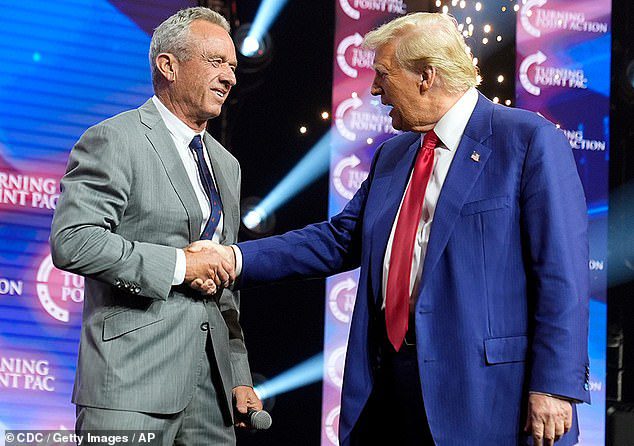
The Centers for Disease Control and Prevention (CDC) has seemingly challenged President Donald Trump by attending a vaccine summit with the World Health Organization (WHO) this week.
Despite an executive directive prohibiting the CDC from engaging with the WHO amid the U.S. withdrawal from the global health body, a representative from the CDC confirmed to DailyMail.com that members will be participating virtually in a WHO conference focusing on influenza vaccines.
The meeting commenced on Monday in London and involves both CDC and Food and Drug Administration (FDA) leaders, although neither agency officially announced their involvement.
It is believed these agencies may have sought special permission from the Trump administration to bypass the prohibition on communications with the WHO.
WHO holds biannual consultations with an expert advisory group to review global influenza data and provide recommendations for the formulation of vaccines for the upcoming flu season.

GOT EACH OTHER’S VAX: Trump and RFK Jr have both promised to overhaul America’s health agencies
These expert recommendations are vital for vaccine manufacturers and regulatory agencies as they develop and approve flu vaccines over the ensuing months.
This week’s conference at the Francis Crick Institute in London primarily addresses vaccines for influenza strains anticipated in the Northern Hemisphere, while a subsequent meeting for the Southern Hemisphere will be held in September.
Health professionals expressed concerns that the absence of U.S. representation could compromise the effectiveness of upcoming flu vaccines.
The WHO group also evaluates emerging flu viruses like the H5N1 avian flu currently circulating in the U.S., as well as other strains that could pose a pandemic threat.
Countries like the U.S. typically produce and stockpile vaccine supplies for potential outbreaks of these viruses.
Recently, Trump signed an executive order initiating the process to withdraw the U.S. from the WHO, although the action does not take effect immediately.
Withdrawal from the WHO necessitates Congressional approval and the fulfillment of the U.S.’s financial commitments for the fiscal year, along with providing a one-year notice.
Additionally, Trump’s administration instructed federal health agencies to limit most public communications until at least the end of the month.
This ban on communication with the WHO raised questions regarding whether CDC and FDA experts could join the critical strain selection meeting, creating uncertainty about how the FDA will instruct flu vaccine suppliers for the forthcoming winter’s shots in the U.S. market.

Susan Coller Monarez is an American health scientist who is Principal Deputy Director of the Centers for Disease Control and Prevention
The CDC sends a team of nearly 30 members to the WHO and allocates millions of dollars to the organization via cooperative agreements.
The U.S. agency is home to some of the world’s foremost experts in infectious diseases and remains in regular contact with WHO staff to address health threats and mitigate their impact.
Trump’s executive actions have implications beyond halting collaborations with WHO. For instance, he also froze funding for PEPFAR, the President’s Emergency Plan for AIDS Relief, which has significantly contributed to saving 25 million lives, including those of 5.5 million children, since it was initiated by President George W. Bush.
PEPFAR provides HIV treatment to over 20 million individuals, and its funding freeze puts countless lives at risk, as highlighted by International AIDS Society President Beatriz Grinsztejn’s statement emphasizing the potentially devastating consequences of halting this critical program.









